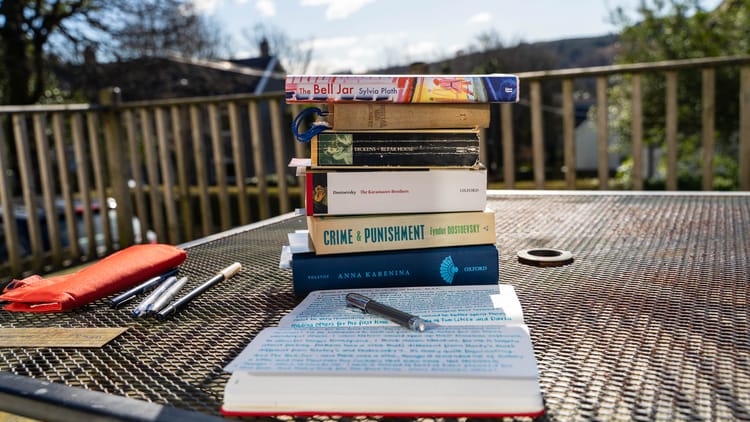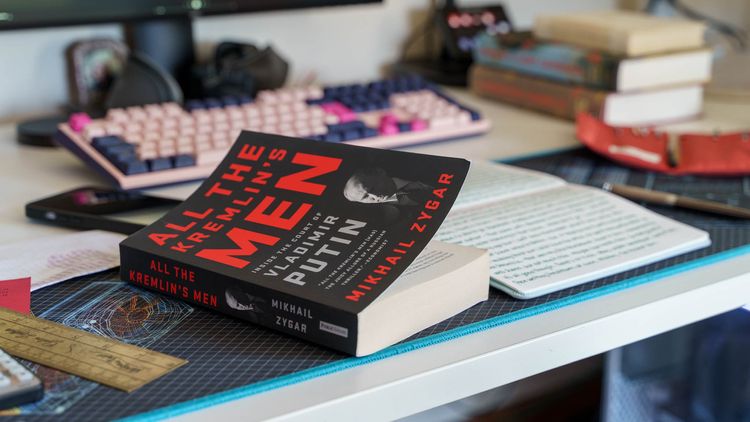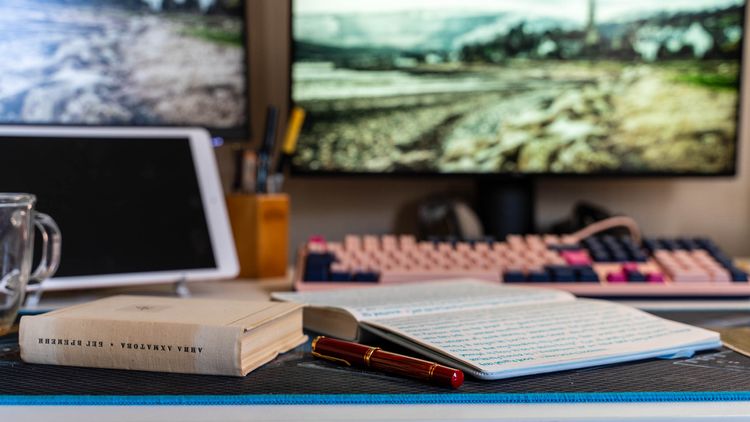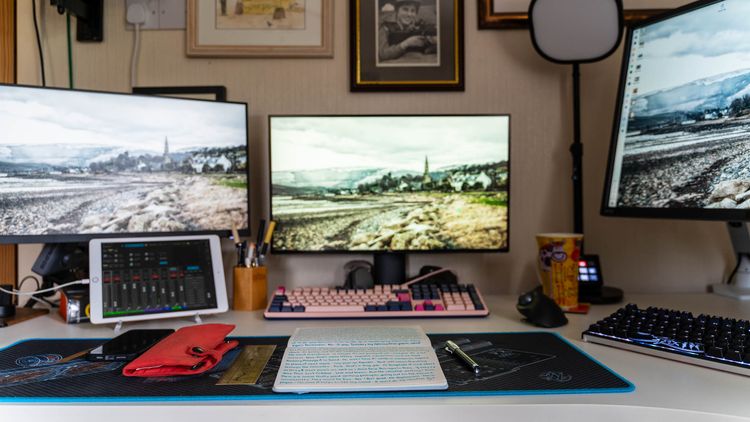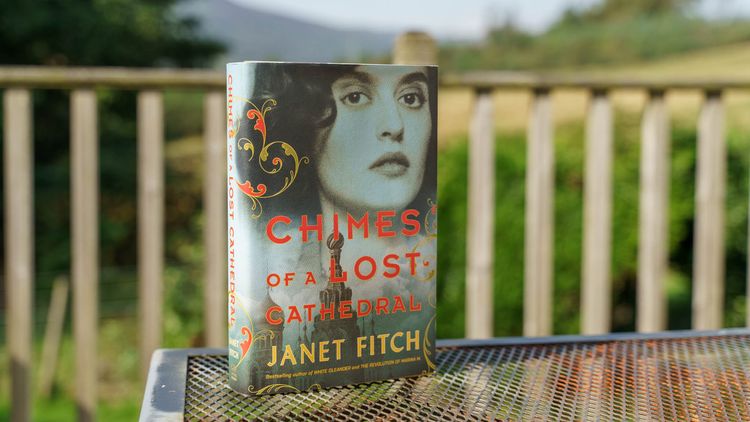Emotion City
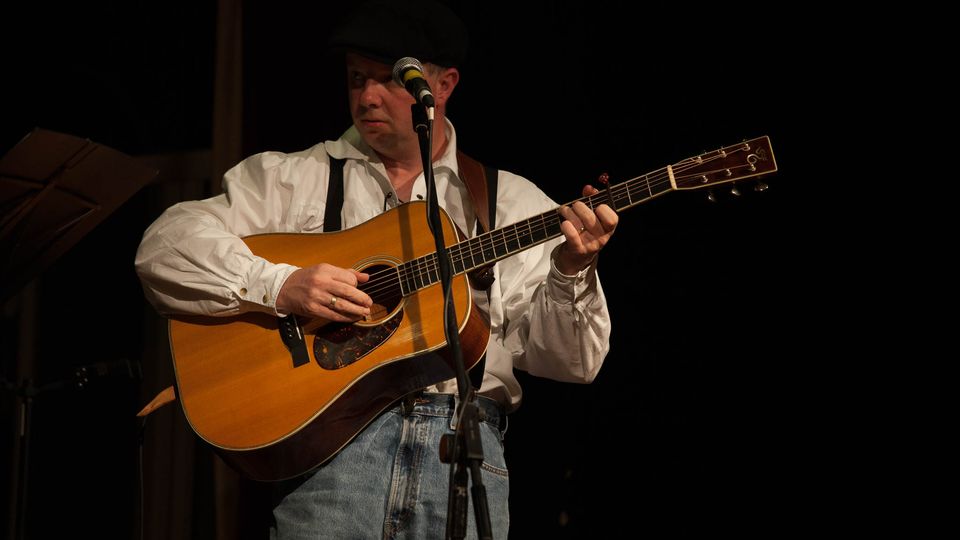
I’m one of those people who pick up their mobile phone as soon as they wake up. You too, huh?
I like to keep a tidy inbox for anxiety reasons, so I usually start my day by going through my email triage routine on the loo. Delete, skim, delete — you know the drill. So when I get to my desk, all that’s left is stuff I want to read properly.
One of those ‘read properly’ pieces this morning was an article by Rob Hardy of Ungated. It contained a link to a music video by Ren, called Hi Ren. Rob’s one of my most trusted creators - if he says a video’s good, I’m going to check it out for sure. As soon as I got to my desk, I clicked the link, and I was gone: a one-way ticket to Emotion City.
I’d also been to Emotion City the day before, taken there by music. In fact, it was more like Emotion the country yesterday, because I found myself ugly-crying at the kitchen table as I listened to Regina Spektor’s song, Firewood. It hit me out of the blue. One minute I’m listening to trad. Scots music by Anna Massie, and the next, I’m sobbing as Regina sings about how her piano is not firewood yet. That’s shuffle mode for you!
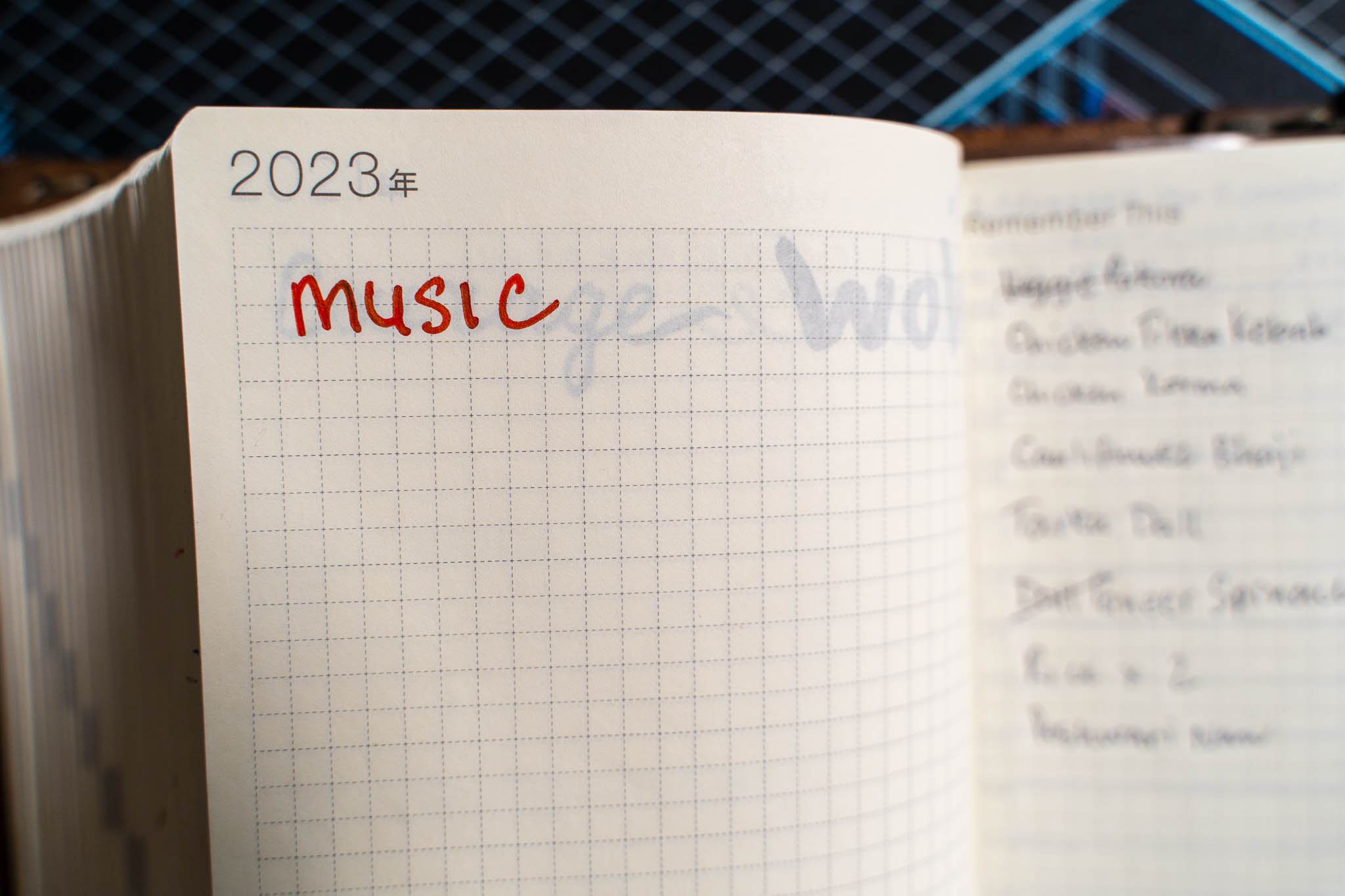
The only reason I was listening to music, not a podcast or audiobook as I usually would, was because I chose music as my theme for 2023. Music has always moved me in unexpected and profound ways. Choosing music as my theme means that I’m deliberately making space for it to open myself up to whatever messages are in that middle ground between the musician and the listener, the university of science, as Pharrell calls it (more on that later). And by making space for music, I also mean playing music. I have my favourite guitar on a stand right beside my desk, so I get to play it multiple times a day. That way, I can shape the raw energy from the universe into new messages, new art.
Looking back
These profound moments of vulnerability experienced through listening to these two pieces of music inspired me to look through some old emails I sent to my wife back when we were courting. We spent eighteen months apart while I was working in my first graduate job as a Russian translator overseas: I was in Almaty, Kazakhstan, and she was in Luxembourg. As long-distance relationships go, we’d gone for it big style!
This was in 2000–2001, so Internet communications weren’t what they are today and international phone calls were expensive. Our primary means of communication, therefore, was email. It was also the period in my life when I really started drinking in an alcoholic way. For that reason, looking back at what I wrote in some of these emails feels uncomfortable, but in the spirit of AA’s tenet that “we shall not regret the past nor wish to shut the door on it,” I’d like to consider what I wrote in one of those emails, written undoubtedly with a bottle of something by my side. In that email, I explained a philosophy of art that had been percolating in my mind, inspired by a book I was reading.
Although this philosophy was conceived while I wasn’t exactly sober, the idea itself was a good one and it has continued to evolve as I travel closer to serenity. So I will look at it here and see where it takes me.
Fantasy Books
Before I found alcohol to escape reality, reading was my thing. From a very young age, I would take solace in the local library, or disappear into my bedroom with a book. As I got older, I would cycle to different parts of the neighbourhood, looking for the perfect quiet spot to read.
My favourite genre of fiction has always been fantasy, and it was when I got that job as a Russian translator in Almaty that I was reading Robin Hobb’s Farseer Trilogy. The trilogy features two concepts that led to the formation of my philosophy of art. Those concepts were called the Wit and the Skill. Here’s what I wrote in my email:
The Skill is a force that she [Robin Hobb] describes as being something euphoric to use, so those with the talent have to be trained how to use it, lest they be seduced by it. If they give into it, they cease to exist, as the Skill force takes the life out of them, which you can read as taking the part of the energy back to where it belongs. Fitz [the main character] described it as having walls to keep others with the Skill out, but when he wanted to use the Skill, he had to lower these walls. Are these ‘walls’ not just another way of saying the defensive buffers? Skill users then are born with the talent to lower these buffers at will. And they can communicate with other Skill users irrespective of time or distance, as where the Skill is concerned, there are no such concepts. Once again, same as the energy. They could also use the Skill to influence the thoughts of others, make them think a storm was coming, make them feel hungry when they weren’t, that sort of thing. In fact, this has just made me realise that it’s exactly the same concept as the Force in Star Wars. And in fact again, one of Han Solo’s lines is that he’d rather trust his blaster than any hocus pocus religion. Again, the reference to religion. Star Wars doesn’t take it as far as the books do though, but it still has the idea of an all-encompassing force.
There was also another concept in the books called the Wit, and that was where a person could sense the life force of others, and even bond with animals to such an extent that they could actually remove their own life force into that of the animal to which they were bonded. I’m not sure what I make of that concept.
I can see where I was going with this. I was talking about life force or energy. At the beginning of my email, I called it harmony, but went on to say that I wasn’t entirely satisfied with that word. I then thought about energy, which seemed like a reasonable fit, but I wanted to convey this energy's chaotic nature, so I went with raw energy. I think I was trying to describe the universe, or my higher power, or, why not just cut to the chase and call it God? Good question. But I wouldn’t have called it that back then. It’s good to know that I was seeking a solution even during my drinking years [This was written in 2000, and I didn’t quit alcohol for good until 2005].
What’s this got to do with art?
This philosophy isn’t a ground-breaking idea or even close, but when I hear artists discussing these big ideas—artists like Jefferey Saddoris and Sean Tucker, for example, or Pharrell and Rick Rubin—I light up and feel inspired to create something, whether that be a piece of writing or music.
In a nutshell, I believe that fearless creative self-expression is the path to happiness. Or, to use another word, art. The difficulty is the fearless part. We get so bogged down by ego, by how we imagine others will perceive what we make, and how that could negatively affect our identity.
I’ve had a few moments in life when I felt a deep connection to something that I couldn’t explain. I made a video about the first time it happened to me and how that moment changed the entire direction of an essay I was about to defend in front of my literature professor at the University of St Andrews. It’s up on my YouTube channel. Feeling that connection just once was enough for me to start thinking about how I might find it again. I’m learning now that that is the work of a lifetime.
When I listened to that Regina Spektor song yesterday, it managed to penetrate my walls and reach into my soul. Yes, the same walls that I described in my email about the Skill. So even in the days when I was using alcohol to escape from the pain of ego-driven sobriety, I was becoming aware of a way out that didn’t involve drugs or alcohol. And that awareness was growing in me through someone else’s artistic vision. In that way, I found myself in the middle, between what the artist is channelling from Source and how my life experience led me to interpret that piece of art.
I wrote about this in a piece called Rick Rubin and Pharrell - University of Science. The title refers to what Pharrell called the space between the artist’s work and the recipient’s interpretation:
“There’s a whole university of science between what’s being played and what you’re hearing.”
I’m not sure that ‘science’ is the best word to describe that space: Art vs science? Science vs religion? Those old chestnuts. I got what he meant, though, and it was validating to hear that concept’s being talked about by two humble giants of the music world.
I believe that if one is open to Source, as Rick Rubin refers to it, one can channel that source into art that expresses their soul. But I also believe that the channel can be uncovered by practising, even when we don’t feel like it - fake it to make it, if you will. That connection is always there. It gets covered over by our egos as we fret and worry, living fear-based lives instead of love-based lives. We don’t open the channel by fighting; we reveal it by letting go, by opening up and listening. It makes me think of Wu Wei, a concept I learned about last year in The Tao of Pooh, by Benjamin Hoff.
These are the ideas that Robin Hobb was dancing around and used as the basis for the concepts of the Skill and the Wit. Through her expressing those ideas in a series of fantasy books, I, a drunk, alcohol-dependent reader, received the message and began to formulate my own idea, filtered through my own life experience, and found a lifelong path to serenity.
Even after 17 years away from alcohol, I’m still figuring out how to apply this concept of fearless self-expression to achieve serenity, meaning and purpose in my life. These words that I’m writing now are an example of that. The book I’m writing is another, bigger expression of that idea. As Darren McGarvey often repeated in his book, Poverty Safari, “People like me don’t write books.” That statement struck a chord with me and inspired me to believe in myself to write one.
Being moved by art is something we need to allow to happen and be open to. I dread to think how many universal messages I’ve missed because I was engaging myself in fear-based living, whether it be busyness, financial difficulty, stress, addiction. I think when the channel is open, it’s love that comes through. I don’t mean love of one person for another; I mean universal love, harmony, peace, oneness, human connection. Those are things I crave and yet still seem to go out of my way to avoid, in a self-harm, self-sabotage kind of way.
So, here I am, fearlessly expressing myself with the written word, practising fearless self-expression after feeling inspired by someone else’s art that hit me at just the right time, as I was coming around from sleep, coffee in hand, ready to start my week. I’m sure this feeling of courage or openness is coming about largely because of my habit of writing Morning Pages every day, even when I don’t want to. I take the time to enjoy the feel of my German fountain pen on the smooth Japanese paper, something which I’ve always enjoyed but rarely made time for. That act is enhanced because it’s off the computer, away from screens. I think that’s also why I’m moving away from Kindle more and more back to physical books. Not exclusively - I’m not that guy. But lying in my cosy, warm bed at night with a physical book or a copy of the Fretboard Journal is a moment in my day that I cherish.
I would love to write more about Resistance (yes, it gets a proper-noun capital for being so damned villainous) and my relationship with it. But Resistance and its sidekick, Impostor Syndrome, are concepts Ren covers so beautifully in Hi Ren. I couldn’t even get close to describing them as well as he does in his song — he makes them into a character in a ridiculously clever way. And when you do listen to it, take note of how it makes you feel; you’ll only ever get to watch it for the first time once.
Buckle up. Next stop: Emotion City.
[I’ve made my original email to my wife available to paid subscribers here]

